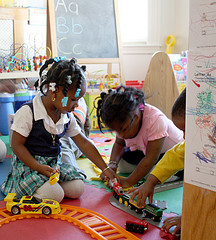Play is the Work of Young Children
February 1, 2012 by Irene Sege

Photo: Alessandra Hartkopf for Strategies for Children
At a time when direct, teacher-centered instruction in preschool and kindergarten classrooms is increasing, Scientific American offers a strong reminder of the importance of play for young learners.
“‘Just playing’ is in fact what nearly all developmental psychologists, neuroscientists and education experts recommend for children up to age seven as the best way to nurture kids’ development and ready them for academic success later in life,” the article states. (1 2 3 4 Next >)
“Decades of research have demonstrated that their innate curiosity leads them to develop their social, emotional and physical skills independently, through exploration—that is, through play. Even animals as diverse as squirrels, horses and bears engage in, and cognitively benefit from, play.”
Writer Paul Tullis summarizes some of the research. Children instructed in how a toy works, one study finds, are less apt to discover its various attributes than children who explore it without direct instruction. And the landmark Hart & Risley study on children’s language development found that children with the widest, richest vocabularies acquired their trove of words through conversation and playful interactions, not direct instruction. “Storytelling, singing, playing, telling jokes—those are the building blocks of extensive vocabularies.” Peter L. Mangione, co-director of the Center for Child and Family Studies at WestEd in San Francisco, tells Scientific American.
A dearth of play, the article notes, could have negative consequences. It cites research from the Perry Preschool Project in Ypsilanti, Michigan, which found that half of children who attended a preschool that emphasized direct instruction had emotional problems by age 23, compared with 6% in a high-quality play-based preschool. “Emphasizing the acquisition of skills such as early reading and geography,” the article states, “comes with a trade-off—less time spent on social and emotional development, which are themselves important to a child’s ability to learn.”
